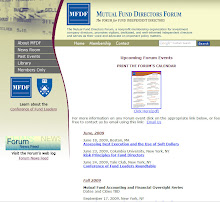With the Supreme Court scheduled to hear arguments in the key fee litigation case Jones v. Harris sometime in October or November, the parties in the case are beginning to file their briefs. This past week, the plaintiffs (in this case, the investors who sued their funds’ adviser, alleging that it charged excessive fees) filed their opening brief. Today we summarize the essential elements of the plaintiffs' argument as set forth in their brief.
The plaintiffs' core argument is that section 36(b), which imposes upon fund advisers “a fiduciary duty with respect to the receipt of compensation for services,” requires both disclosure and fair compensation. They therefore emphatically reject the Court of Appeals conclusion in Jones v. Harris that the market for mutual funds is sufficiently competitive that, in the absence of trickery by the adviser, courts generally should not inquire into the level of fees. The plaintiffs argue that this interpretation is simply contrary to both the language of section 36(b) and the intent of Congress in adopting the provision in 1970. Their argument is strongly rooted in common legal understandings of what a fiduciary duty is – in particular, that by referring to a “fiduciary duty,” Congress must have intended to impose a fairness standard on the fees charged by advisers to funds.
The plaintiffs thus assert that:
In the coming weeks, the adviser, the SEC and other parties will begin to file their own briefs in this matter, and Forum News Feed will post summaries of the key points of each. Ultimately, the case will be argued this fall and decided by next June (though potentially as early as late winter or spring of 2010).
The full text of the plaintiffs' brief is available at: http://www.abanet.org/publiced/preview/briefs/pdfs/07-08/08-586_Petitioner.pdf
To track when pleadings are filed with the Supreme Court in the the Jones v. Harris case, visit the case's docket page: http://origin.www.supremecourtus.gov/docket/08-586.htm
Related articles:
The plaintiffs' core argument is that section 36(b), which imposes upon fund advisers “a fiduciary duty with respect to the receipt of compensation for services,” requires both disclosure and fair compensation. They therefore emphatically reject the Court of Appeals conclusion in Jones v. Harris that the market for mutual funds is sufficiently competitive that, in the absence of trickery by the adviser, courts generally should not inquire into the level of fees. The plaintiffs argue that this interpretation is simply contrary to both the language of section 36(b) and the intent of Congress in adopting the provision in 1970. Their argument is strongly rooted in common legal understandings of what a fiduciary duty is – in particular, that by referring to a “fiduciary duty,” Congress must have intended to impose a fairness standard on the fees charged by advisers to funds.
The plaintiffs thus assert that:
The fiduciary duty imposes two basic requirements with which an investment adviser must comply in obtaining its compensation. First, the adviser must fully and accurately disclose all material facts related to its compensation. Second, the compensation must be fair to the fund, meaning that it comports with what would be bargained for in an arms-length transaction.In explaining what they mean by compensation that is “fair to the fund,” the plaintiffs argue that the standard enunciated in the Gartenberg case, which requires that the fee not exceed what the adviser could have obtained in arm’s length negotiation, is the correct standard. However, the plaintiff’s take issue with a number of other statements in Gartenberg and in other cases that have interpreted Gartenberg over the years. In particular:
- Notably, the plaintiffs disagree with alternate wording in Gartenberg that suggests that an adviser cannot violate section 36b unless it “charge[s] a fee that is so disproportionately large that it bears no reasonable relationship to the services rendered and could not have been the product of arm’s-length bargaining.” In contrast, plaintiffs argue that a fee is appropriate under section 36(b) only if the fee is affirmatively comparable to a fees that have been (or could be) achieved in arm’s-length transactions.
- The plaintiffs also argue that section 36(b) is violated if the adviser does not provide full disclosure of all material facts related to its fee, irrespective of whether the fee is itself reasonable.
- Finally, and perhaps most importantly, the plaintiffs reject any interpretation of Gartenberg under which fees that the fund’s adviser charges to other clients for similar services are legally irrelevant. In contrast to cases that held to the contrary, the plaintiffs argue that such comparisons are highly important, and are of much more value than comparisons to what other advisers charge to other mutual funds with similar investment objectives.
In the coming weeks, the adviser, the SEC and other parties will begin to file their own briefs in this matter, and Forum News Feed will post summaries of the key points of each. Ultimately, the case will be argued this fall and decided by next June (though potentially as early as late winter or spring of 2010).
The full text of the plaintiffs' brief is available at: http://www.abanet.org/publiced/preview/briefs/pdfs/07-08/08-586_Petitioner.pdf
To track when pleadings are filed with the Supreme Court in the the Jones v. Harris case, visit the case's docket page: http://origin.www.supremecourtus.gov/docket/08-586.htm
Related articles:
- "Gartenberg, Jones, Gallus: State of Play for Fund Advisory Fees," May 15, 2009
- "8th Circuit Hands Plaintiffs as Win in Fund Fee Case," April 10, 2009
- "Supreme Court Will Review Fund Fee Case," March 9, 2009
- "Petition to Watch: Jones v. Harris Associates," March 4, 2009
- "K&L Gates' Mark Perlow: 'The Seventh Circuit Rejects Gartenberg -- How Fund Advisers Might Respond'," October 10, 2008





